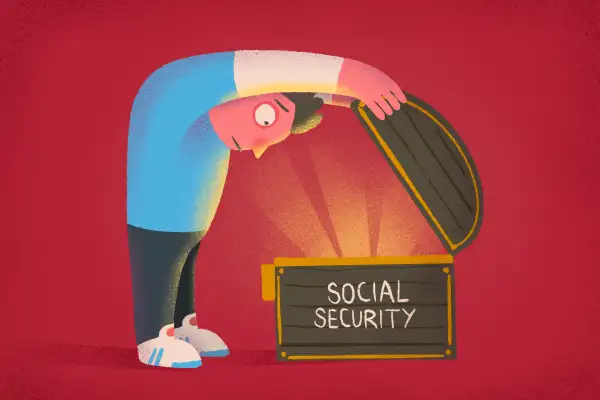What Will Social Security Look Like When Millennials Retire?

Millennials have got a lot to worry about: climate change, a possible wine shortage, whether the new Percy Jackson TV series will do the books justice. Oh, and the fact that even though they're paying into Social Security, the benefits may change by the time they retire.
Social Security is shorthand for the Old-Age, Survivors and Disability Insurance program, which dates back to the 1930s. The law that created it was part of Franklin Roosevelt’s New Deal; it was intended “to provide for the general welfare by establishing a system of federal old-age benefits,” according to its text.
But decades into the program, Social Security is facing major funding challenges. Young people are taking notice: In a 2020 survey from Transamerica, more than three-quarters of millennials confessed to worrying that "Social Security will not be there" when they're ready to retire.
Is this a valid concern? What's actually going on with the future of Social Security? Is it going to run out forever? Here's what to know.
How does Social Security work?
The math was — and still is — too complicated to get into here. But the idea was that people would contribute via payroll taxes and then, later in life, be able to receive monthly benefits.
“We can never insure 100% of the population against 100% of the hazards and vicissitudes of life, but we have tried to frame a law which will give some measure of protection to the average citizen and to his family against the loss of a job and against poverty-ridden old age,” Roosevelt said at the time.
Over the years, the guidelines for the program have changed several times. The broad strokes these days are that you help finance it; you pay 6.2% tax and your company pays 6.2% tax on your earnings up to $142,800. The average monthly Social Security check is $1,543.
Everyone talks about the funds running out because, as the Social Security Administration’s own website admits, it “is not sustainable over the long term at current benefit and tax rates.” It started paying out more than it was collecting in 2010. On top of that, the reserves are set to run out by 2035, at which point the money collected via payroll tax will “be sufficient to pay only about 79% of program costs.”
This is causing some real anxiety, says Amy Shepard, a certified financial planner with Sensible Money in Scottsdale, Arizona.
“A lot of younger people and people closer to retirement have this fear that it's just going to evaporate,” she adds.
What will happen to Social Security in the future?
Shepard says that the general consensus in the financial planning industry is that Social Security won’t suddenly evaporate… but it probably will change. To predict those changes, she likes to look back at the past.
Take the age requirement, for instance. Initially, the full retirement age — the age at which you can get all your benefits — was 65. But in the 1980s, the government moved to gradually raise it to 67. “That extra two years for millions of people to have to wait to collect full benefits bought the system some time,” says Shepard, also a retirement management advisor.
In her opinion, that’s likely to happen again. The full retirement age may increase to 68, 69 or 70. This will be inconvenient, but we'll get advance notice of it.
“We don’t anticipate that they'd make drastic changes for anybody's who really close to or already collecting benefits because of the social ripple effect,” she adds. “There would be uproar. It wouldn't happen because of how much stress that would put on retirees and, in turn, how it would affect the economy.”
Another possible adjustment could have to do with the Social Security wage base. Currently, the taxes max out once people earn over $142,800. President Joe Biden has proposed expanding the wage base so that wages above $400,000 are also subject to Social Security taxes. Shepard says the theory is that, by making higher-income earners contribute more, the program could be solvent for longer.
Should millennials count on Social Security?
Nobody knows what aspects of Social Security will actually end up changing. But Sean Wilson, a senior director of investment products for TIAA, says there is a silver lining: Young adults have a lot of time to figure out their retirement strategy.
“From a planning standpoint, it's prudent to prepare as much as you can and prepare for Social Security not looking like what it looks like right now,” he says. “Ideally, you don't have to rely on Social Security.”
To start, I should make sure I’m maximizing my employer 401(k) match. You can diversify your income stream (by, say, taking on a rental property) and create your own pension by buying an annuity. You can
More from Money:
I Almost Fell for This Social Security Phone Scam. Here's What I Wish I Had Known
This Is the Age When Most People Claim Social Security
Why You Should Open an IRA in Addition to Your Workplace 401(k)
